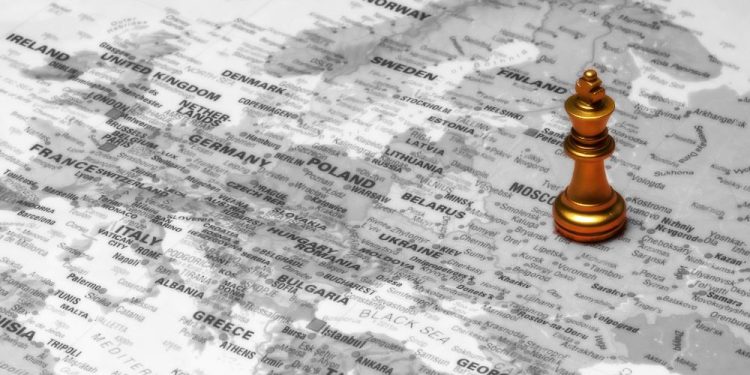(International Man)—Those of us who are libertarians have a tendency to speak frequently of “the New World Order.” When doing so, we tend to be a bit unclear as to what the New World Order is. Is it a cabal of the heads of the world’s governments, or just the heads of Western governments? Certainly bankers are included somewhere in the mix, but is it just the heads of the Federal Reserve and the IMF, or does it also include the heads of JPMorgan, Goldman Sachs, etc.? And how about the Rothschilds? And the Bundesbank—surely, they’re in there, too?
And the list goes on, without apparent end.
Certainly, all of the above entities have objectives to increase their own power and profit in the world, but to what degree do they act in concert? Although many prominent individuals, world leaders included, have proclaimed that a New World Order is their ultimate objective, the details of who’s in and who’s out are fuzzy. Just as fuzzy is a list of details as to the collective objectives of these disparate individuals and groups.
So, whilst most libertarians acknowledge “the New World Order,” it’s rare that any two libertarians can agree on exactly what it is or who it’s comprised of. We allow ourselves the luxury of referring to it without being certain of its details, because, “It’s a secret society,” as evidenced by the Bilderberg Group, which meets annually but has no formal agenda and publishes no minutes. We excuse ourselves for having only a vague perception of it, although we readily accept that it’s the most powerful group in the world.
This is particularly true of Americans, as Americans often imagine that the New World Order is an American construct, created by a fascist elite of US bankers and political leaders. The New World Order may be better understood by Europeans, as, actually, it’s very much a European concept—one that’s been around for quite a long time.
It may be said to have had its beginnings in ancient Rome. As Rome became an empire, its various emperors found that conquered lands did not automatically remain conquered. They needed to be managed—a costly and tedious undertaking. Management was far from uniform, as the Gauls could not be managed in the same manner as the Egyptians, who in turn, could not be managed like the Mesopotamians.
After the fall of Rome, Europe was in many ways a shambles for centuries, but the idea of “managing” Europe was revived with the Peace of Westphalia in 1648. The peace brought an end to the Thirty Years’ War (1618-1648) in the Holy Roman Empire and the Eighty Years’ War (1568-1648) between Spain and the Dutch Republic. It brought together the Holy Roman Empire, The House of Habsburg, the Kingdoms of Spain and France, the Dutch Republic, and the Swedish Empire.
Boundaries were set, treaties were signed, and a general set of assumptions as to the autonomy within one’s borders were agreed, to the partial satisfaction of all and to the complete satisfaction of no one… Sound familiar?
Later, Mayer Rothschild made his name (and his fortune) by becoming the financier to the military adventures of the German Government. He then sent his sons out to England, Austria, France, and Italy to do the same—to create a New World Order of sorts, under the control of his family through national debt to his banks. (Deep Throat was right when he said, “Follow the Money.”)
So, the concept of a New World Order has long existed in Europe in various guises, but what does this tell us about the present and, more important, the future?
In our own time, we have seen presidents and prime ministers come and go, whilst their most prominent advisors, such as Henry Kissinger and Zbigniew Brzezinski, continue from one administration to the next, remaining advisors for decades. Such men are often seen as the voices of reason that may be the guiding force that brings about a New World Order once and for all.
Mister Brzezinski has written in his books that order in Europe depends upon a balance with Russia, which must be created through the control of Ukraine by the West. He has stated repeatedly that it’s critical for this to be done through diplomacy, that warfare would be a disaster. Yet, he has also supported the US in creating a coup in Ukraine. When Russia became angered at the takeover, he openly supported American aggression in Ukraine, whilst warning that Russian retaliation must not be tolerated.
Henry Kissinger, who has literally written volumes on his “pursuit of world peace” has, when down in the trenches, also displayed a far more aggressive personality, such as his angry recommendation to US President Gerald Ford to “smash Cuba” when Fidel Castro’s military aid to Angola threatened to ruin Mr. Kissinger’s plans to control Africa.
Whilst the most “enlightened” New World Order advisors may believe that they are working on the “Big Picture,” when it comes down to brass tacks, they clearly demonstrate the same tendency as the more aggressive world leaders, and reveal that, ultimately, they seek to dominate. They may initially recommend diplomacy but resort to force if the other side does not cave to “reason” quickly.
If we stand back and observe this drama from a distance, what we see is a theory of balance between the nations of Europe (and, by extension, the whole world)—a balance based upon intergovernmental agreements, allowing for centralised power and control.
This theory might actually be possible if all the countries of the world were identical in every way, and the goals of all concerned were also identical. But this never has been and can never be the case. Every world leader and every country will differ in its needs and objectives. Therefore, each may tentatively agree to common conditions, as they have going back to the Peace of Westphalia, yet, even before the ink has dried, each state will already be planning to gain an edge on the others.
In 1914, Europe had (once again) become a tangle of aspirations of the various powers—a time bomb, awaiting only a minor incident to set it off. That minor incident occurred when a Serbian national assassinated an Austrian crown prince. Within a month, Europe exploded into World War. As Kissinger himself has observed in his writings, “[T]hey all contributed to it, oblivious to the fact that they were dismantling an international order.”
Since 1648, for every Richelieu that has sought to create a New World Order through diplomacy, there has been a Napoleon who has taken a militaristic approach, assuring that the New World Order applecart will repeatedly be upset by those who are prone to aggression. Further, even those who seek to operate through diplomacy ultimately will seek aggressive means when diplomatic means are not succeeding.
A true world order is unlikely. What may occur in its stead would be repeated attempts by sovereign states to form alliances for their mutual benefit, followed by treachery, one- upmanship, and ultimately, aggression. And very possibly a new World War.
But of one thing we can be certain: Tension at present is as great as it was in 1914. We are awaiting only a minor incident to set off dramatically increased international aggression. With all the talk that’s presently about as to a New World Order, what I believe will occur instead will be a repeat of history.
If this belief is correct, much of the world will decline into not only external warfare, but internal control. Those nations that are now ramping up into police states are most at risk, as the intent is already clearly present. All that’s needed is a greater excuse to increase internal controls. Each of us, unless we favour being engulfed by such controls, might be advised to internationalise ourselves—to diversify ourselves so that, if push comes to shove, we’re able to get ourselves and our families out of harm’s way.





